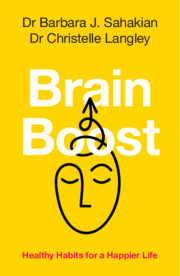Book contents
- Reviews
- Brain Boost
- Brain Boost
- Copyright page
- Dedication
- Contents
- Foreword
- Introduction
- 1 The Importance of Exercise
- 2 Eating for Health and Wellbeing
- 3 Why Do We Need Sleep?
- 4 Why Is Social Interaction So Important?
- 5 Social Kindness and Helping Others
- 6 Mindfulness and Enjoying the Moment
- 7 Keeping Your Brain Fit through Learning
- 8 Don’ts: What Not to Do
- 9 Experience the Benefits of Work
- 10 Now It’s Your Time to Boost Your Brain
- Acknowledgements
- References
- Index
5 - Social Kindness and Helping Others
Giving and Volunteering
Published online by Cambridge University Press: 23 January 2025
- Reviews
- Brain Boost
- Brain Boost
- Copyright page
- Dedication
- Contents
- Foreword
- Introduction
- 1 The Importance of Exercise
- 2 Eating for Health and Wellbeing
- 3 Why Do We Need Sleep?
- 4 Why Is Social Interaction So Important?
- 5 Social Kindness and Helping Others
- 6 Mindfulness and Enjoying the Moment
- 7 Keeping Your Brain Fit through Learning
- 8 Don’ts: What Not to Do
- 9 Experience the Benefits of Work
- 10 Now It’s Your Time to Boost Your Brain
- Acknowledgements
- References
- Index
Summary
Engaging in acts of kindness, such as volunteering and donating, has profound benefits for mental and emotional wellbeing. These actions foster a sense of purpose and fulfilment, enriching both personal lives and communities. Volunteering promotes social responsibility and community cohesion, fostering empathy and personal growth. Research shows that volunteering is associated with greater life satisfaction, reduced symptoms of depression and anxiety, and improved cognitive function, particularly in older adults. The act of giving activates brain regions involved in reward and social attachment, releasing neurotransmitters like dopamine and serotonin that enhance mood and promote pro-social behaviour. Serotonin levels influence empathy and cooperation, while dopamine reinforces altruistic behaviour. Pro-social actions contribute to a harmonious society, fostering connection, understanding, and mutual support. Despite global challenges, people continue to donate and volunteer, driven by a sense of global responsibility and empathy. Embracing kindness not only benefits others, but also enhances personal wellbeing and satisfaction, regardless of age.
- Type
- Chapter
- Information
- Brain BoostHealthy Habits for a Happier Life, pp. 57 - 67Publisher: Cambridge University PressPrint publication year: 2025

